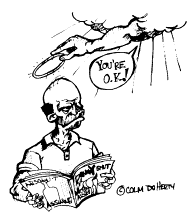![]()
![[ OPINIONS ]](/images/fall97/opinionsf97.gif)
![]()
By Erin Kirsten Stein
Arizona Daily Wildcat October 31, 1997
God would like to talk to you
![[Picture]](05_1_i.gif)
Erin Kirsten Stein |
I had a little talk with God Monday night.
He says, "Hi."
Actually, I went to a lecture in Phoenix, given by Neale Donald Walsch - author of Conversations with God: an uncommon dialogue, book 1.
There's also a book 2 and next fall, book 3 will be released.
These books are transcriptions, automatic writings if you will, of Walsch's very own talks with God.
I know you're all out there snorting in derision (I've always wanted to use that!) and guffawing at this preposterous idea, but pay attention, please.
Walsch is an ordinary guy. A little scruffy, he is down to earth and humble. Walsch is the first person to admit it sounds strange. He thought he was crazy at first, but eventually decided to trust his instincts.
One night, at a very low point in his life, Walsch couldn't sleep. He was so angry that his job sucked and his love-life sucked and his health sucked that he wanted to scream. Instead, he sat down at 4 a.m. and began to write. He wrote down all his questions, which amounted to, "Why does my life suck?" and "What have I done to deserve this?"
He got an answer.
Unable to put the pen down, Walsch's mind was filled with thoughts, not his own, and he poured them out onto paper.
The first thing God said to him was, "Do you really want an answer to all these questions, or are you just venting?"
God can be a real smart-ass sometimes.
Walsch wanted an answer, of course, and so kept writing and hasn't stopped.
But God doesn't just talk to Walsch, he talks to you.
"You are about to have an extraordinary experience. You are about to have a conversation with God."
That's Walsch's intro, and he isn't kidding; it's an experience.
Walsch had no intention of publishing his midnight ramblings on paper, but God wanted to talk to all of us.
I've read both books. I laughed, I cried and I was moved.
God speaks to the reader, to you, and damned if I don't agree with everything he says.
In his lecture, Walsch outlined a few key points that are in the book.
1. "You are one with everything, there is nothing you are not."
The classic one-is-all truism. What stops us from realizing the full potential of this connection is fear. Walsch says there is only fear and love. He said love will win when we can look into each other's eyes and see parts of ourselves and love what we see, no matter who we are looking at - black or white, male or female, gay or straight. Underneath, we are all the same.
A bit cliché, but still beautiful.

2. "There's enough."
That's right folks. God says to get it through your thick skulls that there is enough food and money and love and time. It's all here, waiting for us. Unfortunately, we have created a society in which some hoard it, creating the haves and the have-nots. Walsch said the have-nots are dying of hunger at the rate of 400 people a minute. Share a little.
3. "Love is all there is." In our highest truths, we are love, that is all. All the other "bad" stuff here on earth is what we are not. It is here so we may experience what we are. Do you follow? You cannot experience what you are unless you are surrounded by what you are not.
4. "Tell the truth." To yourself, about yourself, as well as to others. Walsch also denounced the idea of God as a vengeful deity who punishes. He loves us, and as to what we do, well, let me use God's words, according to Walsch:
"Whatever you do, I don't give a damn. I will give a blessing, but I won't give a damn."
One concept in particular is crucial to understanding the world as Walsch does. You create who you are. You create your life with what you think, feel and do.
God created us in his likeness, as creators.
People constantly complain, "I want more." Money, love, happiness - there's never enough. But God says there is enough, remember?
By saying you "want" something, you are creating the experience of wanting it. If you say I "have" something, I have enough money, then it will be so.
Of course, it's not that easy, you ninnies. God is not an ATM machine. You must alter your belief systems to accommodate your new creating thought and you must think it in earnest.
I could go on forever, sharing Walsch's insights, but it's all in the book and God explains it much better than I do.
But one more gem. God told Walsch, there is no objective right and wrong. We're making it all up as we go along. Walsch implores us, therefore, to agree to disagree with each other.
What's right for me may be wrong for you, but I won't tell you what's right for you and you won't tell me what's right for me, OK?
Yeah, I know. Try reading it again.
"Try to live this way," Walsch said, "it's called love."
Try to live this way and give the book a chance to teach you something. Even if you think this talking to God stuff is manure, read it and then agree to disagree with it.
The insights and ideas are themselves good ideas, with or without divine inspiration.
Erin Kirsten Stein is a senior majoring in creative writi ng, journalism and general fine arts studies.



